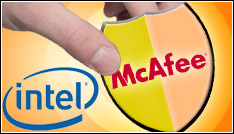Intel Tries To Appease EU Fears Over McAfee Deal

Intel is offering promises to EU regulators to alleviate antitrust fears over the McAfee acquisition
Intel is offering concessions to European regulators in hopes of gaining approval for its proposed $7.68 billion (£5 billion) acquisition of security software maker McAfee.
The deal, which was approved last month by the US Federal Trade Commission, is still being reviewed by the European Commission, which reportedly has had antitrust concerns about the deal.
Intel Domination Concerns
 According to reports last month, those concerns centred around the fear that using McAfee to build greater security into its processors, Intel, the world’s top chip vendor, would unfairly hurt the ability of McAfee’s rivals to compete. McAfee is the world’s second-largest security software maker after Symantec. Intel’s dominance of the chip market makes it an important partner for security software makers outside of McAfee.
According to reports last month, those concerns centred around the fear that using McAfee to build greater security into its processors, Intel, the world’s top chip vendor, would unfairly hurt the ability of McAfee’s rivals to compete. McAfee is the world’s second-largest security software maker after Symantec. Intel’s dominance of the chip market makes it an important partner for security software makers outside of McAfee.
Intel officials have issued proposals in hopes of allaying antitrust fears, the European regulatory agency said on its Website. In response, the EC extended its deadline for reviewing the deal by two weeks, to January 26.
The commission did not give details of what was in the Intel proposal. Intel spokespeople confirmed that a proposal was submitted, but also have not elaborated on details and said the company continues to work with the EC.
Intel executives still expect the deal to close in the first half of the year.
Intel officials have been pushing to expand their business beyond their traditional roots in PCs and servers. The company is looking to extend its reach into such fast-growing markets as tablet PCs and smartphones, as well as areas such as embedded devices.
The chip maker has made various acquisitions to further its aims, including buying Infineon’s wireless business for $1.4 billion (£1 billion). The McAfee deal will enable the company to bring greater security capabilities into their processors, officials have said. Integrating security features onto the chip will make it more difficult for hackers to attack a device, and such security capabilities will run more quickly if put directly onto the chip, they have said.
Intel’s goal is to run McAfee as a separate business, headed by current McAfee CEO Dave DeWalt. McAfee will also continue selling its software to other businesses.
Anticompetitive Intel
Intel has had a rocky relationship with the European Union in the past. In 2009, European regulators fined Intel $1.45 billion (£1 billion) for what they said was anticompetitive behaviour designed to unfairly stifle competition from rivals such as Advanced Micro Devices. The EC found that Intel gave pricing breaks and rebates to computer OEMs to limit their use of AMD products.
US regulators and AMD levelled similar allegations at Intel, though most of those cases have since been settled. Intel executives have denied allegations of antitrust behaviour, saying that their business practices, while aggressive, did not violate any laws.